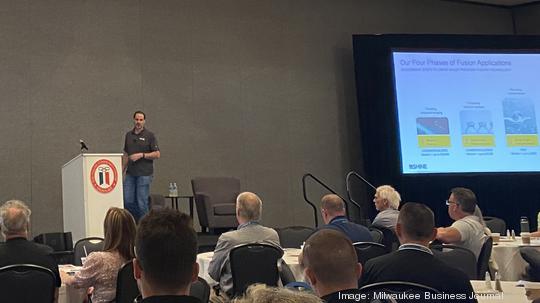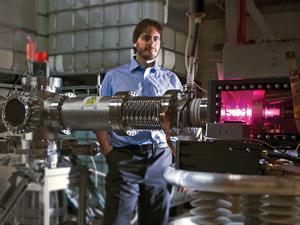
SHINE Technologies LLC will begin ramping up production of its medical isotopes next year as it plans to increase cost effectiveness to eventually move its fusion technology into the recycling of nuclear waste and the fusion energy fields, CEO Greg Piefer said at the Wisconsin Entrepreneurs’ Conference Thursday.
Janesville-based SHINE is currently working in its phase two of company development where it produces medical isotopes using small-scale nuclear transmutation, which converts one element into another. Medical isotopes have historically been produced in nuclear reactors that produce waste lasting thousands or millions of years, Piefer said at the conference.
“We’re laser-focused on being the biggest medical isotope production company in the world,” Piefer said.
These isotopes can be used for nuclear imaging to detect life-threatening conditions like cardiovascular disease or tumors, conduct radiation therapy treatment and sterilize medical equipment.
Piefer said he expects the company’s Janesville facilities to begin producing medical isotopes at a large scale next year. The company hopes to capture a significant portion of the market for medical isotopes used in diagnosing and treating serious illness, SHINE Technologies said in an email statement to the Milwaukee Business Journal.
SHINE will build a similar facility in the Netherlands set to be finished around 2026, Piefer said at the conference.
Piefer said the company’s medical isotope phase is a “pilot model” for its nuclear waste recycling phase, or phase three. This phase will focus on dissolving nuclear waste and separating out valuable materials.
SHINE can be paid more for each reaction its fusion technology performs in the nuclear waste recycling industry, Piefer said at the conference. This short-term commercial focus will enable the company to move into its phase four, a broader but more costly plan to use fusion technology to replace fossil fuels, renewable energy and nuclear fission reactors, according to the company website.
“Most people who are pursuing fusion are still looking at the science of it,” Piefer said at the conference. “At the end of the day you need a team that can exist in this complex regulatory environment that can deliver cost-effective progress in a nuclear space.”
Nuclear fusion energy doesn’t create greenhouse gases or nuclear waste. This characteristic puts SHINE in a position to limit climate change if they can reduce the costs in the fusion energy industry, a goal Piefer conceded the company is still working toward.
“What we need to be able to do to go from (phase) three to four is just to reduce cost,” Piefer said. “My hope is that through operating lots of machines in phase three and building lots of machines, we'll learn how to make it cheaper.”
SHINE Technologies will ramp up production of its medical isotopes in 2023. A prior version of this article misreported the status of SHINE Technologies' medical isotope production.






